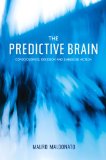May 5, 2014

The Predictive Brain: Consciousness, Decision and Embodied Action by Mauro Maldonato (Sussex Academic Press, 2014)
(kindle ed.), (amazon.co.uk), (UK kindle ed.)
Book description from the publisher:
An investigation of the working of the human mind, this book sets out to show that the brain is not only a reactive mechanism, but rather proactive, allowing people to make hypotheses, anticipate consequences, and formulate expectations. The book discusses how the evolution of motor modes of behavior, such as the ability to construct and manipulate instruments, has given rise to an “embodied logic” underpinning not only action and prediction but also gestures and syllable sequences that are the basis of human communication. This book then looks at how, if consciousness is caused by specific neuronal processes and, therefore, conscious states are causally reducible to neurobiological processes, it is also true that conscious states exist at a higher level than neuron activity. For this reason, this work argues that it is necessary to go beyond a hierarchical idea of levels of consciousness, and to refute the idea according to which the mental sphere is qualitative, subjective, and in the first person, while the physical sphere is quantitative, objective, and in the third person.
Google Books preview:
See also: Author’s website
Comments (0)
- consciousness,new books,self
May 4, 2014

Thought in the Act: Passages in the Ecology of Experience by Erin Manning and Brian Massumi (University of Minnesota Press, 2014)
(kindle ed.), (amazon.co.uk), (UK kindle ed.)
Book description from the publisher:
“Every practice is a mode of thought, already in the act. To dance: a thinking in movement. To paint: a thinking through color. To perceive in the everyday: a thinking of the world’s varied ways of affording itself.” —from Thought in the Act
Combining philosophy and aesthetics, Thought in the Act is a unique exploration of creative practice as a form of thinking. Challenging the common opposition between the conceptual and the aesthetic, Erin Manning and Brian Massumi “think through” a wide range of creative practices in the process of their making, revealing how thinking and artfulness are intimately, creatively, and inseparably intertwined. They rediscover this intertwining at the heart of everyday perception and investigate its potential for new forms of activism at the crossroads of politics and art.
Emerging from active collaborations, the book analyzes the experiential work of the architects and conceptual artists Arakawa and Gins, the improvisational choreographic techniques of William Forsythe, the recent painting practice of Bracha Ettinger, as well as autistic writers’ self-descriptions of their perceptual world and the experimental event making of the SenseLab collective. Drawing from the idiosyncratic vocabularies of each creative practice, and building on the vocabulary of process philosophy, the book reactivates rather than merely describes the artistic processes it examines. The result is a thinking-with and a writing-in-collaboration-with these processes and a demonstration of how philosophy co-composes with the act in the making. Thought in the Act enacts a collaborative mode of thinking in the act at the intersection of art, philosophy, and politics.
See also: Manning’s website, Massumi’s website
Comments (0)
- culture,new books
May 3, 2014

Advances in Experimental Philosophy of Mind, ed. by Justin Sytsma (Bloomsbury, 2014)
(kindle ed.), (amazon.co.uk), (UK kindle ed.)
Book description from the publisher:
The past decade has witnessed an exciting (and controversial) new approach to philosophy: Experimental philosophers aim to supplement, and perhaps to supplant, traditional philosophical approaches by employing empirical methods from the social sciences. In Advances in Experimental Philosophy of Mind, leading experimental philosophers apply these methods to questions about the nature of the mind, the self, consciousness, moral judgment, and concepts.
By bringing empirical methods to bear on key issues, Advances in Experimental Philosophy of Mind pushes the debates forward, casting new insight on perennial problems. This is an essential resource for professors, graduate students, and advanced undergraduates interested in either philosophy of mind or the burgeoning field of experimental philosophy.
Google Books preview:
Comments (0)
- new books,philosophy of mind





